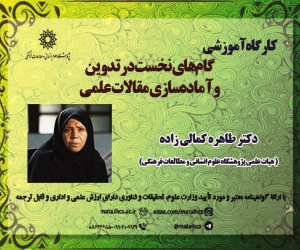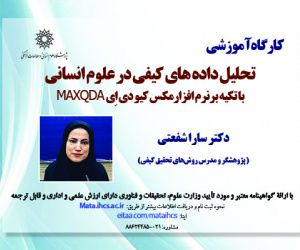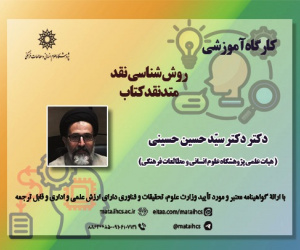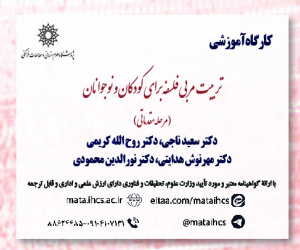ارائه الگوی تأثیرگذاران بازاریابی در شبکه اجتماعی (مورد مطالعه: صنعت مد) (مقاله علمی وزارت علوم)
درجه علمی: نشریه علمی (وزارت علوم)
آرشیو
چکیده
شرکت ها برای انتخاب تأثیرگذار مناسب و گرفتن یک بازخورد خوب به اطلاعاتی بیش از تعداد لایک و کامنت نیاز دارند؛ بنابراین هدف از پژوهش حاضر ارائه الگویی از تأثیرگذاران بازاریابی و مشخصات آنها در شبکه اجتماعی اینستاگرام در صنعت مد برای رسیدن به بهترین تأثیرگذار است. در این مطالعه روش گردآوری داده ها به دو روش کتابخانه ای و میدانی انجام شده است. برای گردآوری داده های بخش کیفی از مصاحبه های نیمه ساختار یافته استفاده شد. ابزار جمع آوری داده ها در بخش کمّی پرسشنامه محقق ساخته بود که از نتایج بخش کیفی تدوین و بین 172 نفر به صورت نمونه گیری تصادفی غیراحتمالی توزیع شد. برای تجزیه و تحلیل داده های کیفی پژوهش از تحلیل محتوای کیفی استقرایی، برای تجزیه و تحلیل داده ها در بخش کمّی از آمار توصیفی و برای بررسی سؤال های پژوهش از آمار استنباطی و روش حداقل مربعات جزئی (PLS) به کمک نرم افزارهای SPSS و SMARTPLS استفاده شد. نتایج پژوهش حاکی از آن است که تأثیرگذاران بازاریابی در شبکه های اجتماعی دو ویژگی اصلی دارند: ویژگی های مربوط به شخصیت و ویژگی های مربوط به بازاریابی. بازاریابی تأثیرگذار نمونه ای از بازاریابی در بستر شبکه های اجتماعی است که شامل پیشنهاد و معرفی محصول و خدمات با تأثیرگذاران است. این تأثیرگذاری بر بازار بیشتر برگرفته از تخصص، شهرت و یا محبوبیت افراد است. در این پژوهش نیز ویژگی ها و مشخصه های بیشتری به عنوان ویژگی های افراد تأثیرگذار در شبکه اجتماعی اینستاگرام شناسایی و تعیین شد که در پژوهش های مشابه یافت نشد. یافته های این پژوهش به کسب و کارها در صنعت مد کمک می کند تا با شناسایی دقیق ویژگی های شخصیتی و بازاریابی تأثیرگذاران اینستاگرام انتخاب های هوشمندانه تری را در راستای بهبود اثربخشی کمپین های بازاریابی و افزایش تعامل با مخاطبان هدف داشته باشند. همچنین، این نتایج می تواند استراتژی های بازاریابی دیجیتال را بهینه و اعتماد مشتریان به برندها را تقویت کند.Presenting a Model of Marketing Influencers in the Social Network: A Case Study of Fashion Industry
The rise of social networks has established a platform for global communication and interaction. Among these, Instagram distinguishes itself as one of the most popular networks, attracting considerable attention from brands and business managers due to its high engagement rates. The informal dynamics of platforms like Instagram have facilitated the emergence of influencers—ordinary individuals, who create and share content across various contexts. To select the right influencer and ensure effective feedback, businesses need insights that extend beyond mere likes and comments. This study aim to develop a comprehensive model of marketing influencers and their characteristics within the Instagram platform with a particular focus on the fashion industry.This mixed-method research use both qualitative and quantitative approaches. Data collection involved library research and field methods. The qualitative phase utilized semi-structured interviews, while the quantitative phase employed a researcher-designed questionnaire distributed among 172 respondents selected through non-probability random sampling. Qualitative data were analyzed using inductive content analysis, while quantitative data were processed using descriptive and inferential statistics with SPSS and SMARTPLS software.The findings show two primary categories of influencer characteristics: personality-related and marketing-related. Personality traits encompass creativity, trustworthiness, and uniqueness, while marketing-related traits included brand impact, high engagement, and audience connection. These insights enhance existing research by identifying additional characteristics unique to Instagram influencers, providing valuable guidance for businesses in the fashion industry. IntroductionThe dynamics of social networks like Instagram have transformed the media landscape and advertising models. Influencers recognized as opinion leaders have become pivotal in shaping consumer behavior and brand interactions. Businesses are increasingly adopting influencer marketing strategies to better understand customer preferences, meet expectations, and enhance engagement. However, successful implementation requires a nuanced understanding of influencer traits and their impacts. While previous studies have examined quantitative metrics, such as follower counts and likes, fewer have explored the comprehensive characteristics of influencers. Considering the socio-cultural and economic diversity across markets, this study aim to fill this gap by proposing an actionable model for marketing influencers on social networks. The research focuse on two core questions:What personality traits define marketing influencers and what components and indicators do these traits encompass?What marketing traits characterize influencers and what components and indicators do these traits include?Materials & MethodsThis applied research use a descriptive-survey and mixed-method approach. In the qualitative phase, 50 articles published in the past 5 to 6 years on influencer marketing were reviewed with 36 selected for in-depth analysis. Experts validated data from these articles to ensure comprehensive coverage.Qualitative data collection involved library research and semi-structured interviews, which were analyzed using inductive qualitative content analysis. The quantitative phase targeted consumers with experience engaging with fashion industry influencers on Instagram. A non-probability random sampling method was used to select 172 participants. Data collection utilized a researcher-designed online questionnaire based on qualitative findings. The validity and reliability of the questionnaire were confirmed through construct validity (factor analysis) and Cronbach's alpha.Research FindingsQualitative analysis identified two main dimensions: personality-related and marketing-related characteristics. Codes from the literature were refined into components, each accompanied by explanatory concepts. In the quantitative phase, the SMARTPLS model revealed both external (measurement) and internal (structural) patterns.Personality traits included creativity, trust, social skills, uniqueness, and individual competencies. These traits established authenticity and credibility, fostering stronger connections with the audience. Marketing traits encompassed brand loyalty, high engagement, aesthetic appeal, and content production, all of which directly influence brand visibility and consumer behavior.The model's reliability and validity were confirmed through several statistical tests, including Cronbach's alpha, composite reliability, and mean variance extracted (convergent validity). Structural model analysis indicated a robust fit, with predictor variables explaining significant variances in the dependent traits.Discussion of Results & ConclusionThe first research question examined the characteristics and features of marketing influencers, along with the indicators and components that defined these traits. The findings revealed that marketing influencers on social networks possessed two primary categories of traits: personality-related characteristics and marketing-related characteristics. Personality-related traits were closely tied to the individual qualities of the influencer and included components, such as social skills, creativity, educational value, knowledge, and trustworthiness, the ability to spark interest, attractiveness, unique competencies, and distinct personality traits. These characteristics enabled influencers to forge genuine connections with their audiences, fostering trust and engagement.In contrast, marketing-related characteristics pertained specifically to the marketing domain. These included the ability to create brand loyalty, effective branding, brand impact, endorsement capabilities, high engagement levels, meaningful connections, content creation, verified status (blue tick), aesthetic appeal, competitiveness, audience reach, and relevance to the target market, the capacity to drive sales, active engagement, specialized expertise, and success in establishing impactful support networks. These components enhanced an influencer's ability to align with brand values, expand audience reach, and deliver measurable results for businesses.The second research question explored specific indicators and characteristics that defined marketing influencers. Influencers were distinguished by their capacity to produce attractive and engaging content, establish customer trust, disseminate accurate and timely information, and demonstrate awareness of key events and trends. Additionally, traits, such as honesty, humility, ethical behavior, conscientiousness, creativity, problem-solving abilities, and the capacity to inspire and motivate audiences were critical. Influencers had to excel in social skills, including consultation, creating joy, and fostering motivation.From a practical standpoint, influencers had to possess strong communication skills, including the ability to articulate their perspectives effectively and engage in meaningful self-disclosure. Attributes, such as enthusiasm for their work, decision-making capabilities, and purpose-driven behavior, further distinguished successful influencers. They had to also demonstrate commitment, emotional intelligence, compatibility with their audience, and ability to align their personality with the brand's image. Expanding access to target customers, improving interpersonal communications, and fostering constructive, two-way interactions with brands and audiences were essential for their success.Moreover, influencers had to manage their relationships with audiences in ways that build trust and maintained the brand's credibility. Their role often involved enhancing customer behavior, facilitating decision-making, and influencing purchasing preferences. This included creating a positive brand image, encouraging deeper engagement with audiences, and driving sales effectively. The ability to adapt to new markets and attract diverse customer bases further enhanced their impact.While quantitative metrics, such as high follower counts, shares, likes, and comments, remained important, they had to be complemented by qualitative capabilities. These included scenario planning, crafting strategies tailored to market demands, reducing advertising costs, building extensive social connections, and fostering collaborations with organizations. Familiarity with consumer preferences, expertise in strategic advertising, and an understanding of legal and regulatory frameworks were equally critical. Influencers had to also focus on specific audience segments to maximize their effectiveness.In conclusion, this study highlight the dual roles influencers play as both creative individuals and strategic marketers. Their personality-related traits established authenticity and relatability, while their marketing-related characteristics drive measurable results. Businesses in the fashion industry could leverage this comprehensive framework to select influencers, who effectively balanced these traits, ensuring impactful campaigns and long-term success. By focusing on these attributes, brands can optimize their influencer strategies, foster trust with their target audiences, and achieve competitive advantages in a rapidly evolving digital landscape. Future research could expand this model to other industries or explore the longitudinal impacts of influencer marketing to provide deeper insights into its effectiveness.











